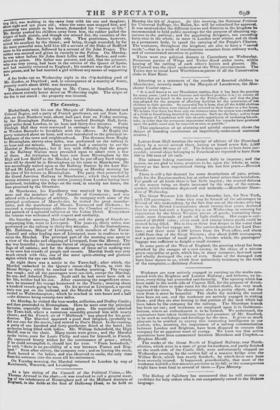trbe Country.
MarhalSoult, with his son the Marquis of Dalmatia, Admiral and Colonel Napier, and a party of French gentlemen, set out from Lon- don, on their Northern tour, about half-past four on Friday morning, by the Birmingham Railway. They reached Denbigh Hall, forty. eight miles from London, in an hour and thirty-five minutes. From Denbigh Hall they were conveyed in carriages to Rugby ; stopping at Weedon Barracks to breakfast with the officers. At Rugby the party remained about an hour, and were introduced to the principal in-
habitants of the town and neighbourhood. The distance from Rugby to Birmingham, twenty-nine miles, was performed on the railway iii an hour and one minute. Many persons had a curiosity to see the Marshal at Birmingham ; but it was with difficulty that the people at the Railway Station were prevailed upon to admit even a few of those. An invitation had been sent from Birmingham by the High and Low Bailiff to the Marshal ; but he put off any fixed engage- ment till he should be in Birmingham on his route to Manchester. He was accordingly waited upon at the Railway Station by the Low Bai- liff and Mr Lloyd, and fixed Sunday evening or Monday morning for
the time of his return to Birmingham. The party then proceeded by the Grand Junction Railway to Manchester ; which they reached at twenty minutes past two; the entire journey from London having been performed, including the delays on the road, in exactly ten hours, the time promised by the Directors.
At Manchester, his Excellency was received by the Borough- reeve and the members of the Chamber of Commerce ; and was saluted with a discharge of artillery. In company with some of the principal gentlemen of Manchester, he visited the great manufac- tories, and the warehouse of Messrs. Townsend and Hickson ; he received a complimentary address from the Chamber of Como-mice, and partook of a splendid collation at the Union Hotel. Everywhere the veteran was welcomed with respect and cordiality.
On Saturday morning, Marshal Soult, and the party of friends ac- companying him, went to Liverpool. The jourcey, thirty miles, was performed on the railway in thirty-five minutes. At the Stationhouse, Mr. Rathbone, Mayor of Liverpool, with members of the Town- Council and other leading men of Liverpool, were in readiness to re- ceive the Marshal. The principal part of the morning was spent in a view of the docks and shipping of Liverpool, from the Mersey. The day was beautiful ; the immense forest of shipping was decorated with flags of all nations; and for the distance of three mi'es nothing was to be seen but crowds of people and vessels. Marshal Soult was very much struck with this, one of the most spirit-stirring and glorious sights which the eye can behold.
At night there was a soirée in the Town-hall ; after which, the Marshal embarked in the Queen's steam-ship Thetis, to visit the Menai Bridge ; which he reached on Sunday morning. The voyage was rough ; and all the passengers were sea-sick, except the Marshal, his son, and Admiral Napier. Soult said he had never been sick in his life, neither had his son. After examining the magnificent struc- ture, he resumed his voyage homeward in the Thetis ; meeting about a hundred vessels going to sea. On his arrival at Liverpool, a special train was put on the railroad, and the Marshal with his party pro- ceeded to Wolverhampton ; which he reached in two hours and a half —the distance being seventy-two miles.
On Monday, he visited the iron-works, collieries, and Dudley Castle ; and then proceeded to Birmingham. Here he went over the principal factories, especially those for making guns. He especially admired the Town.hall, where a numerous assembly greeted him with hearty
cheers; and the French air of " Malbrook" was played for his grati- fication. The "'Marshal appeared a good deal fatigued, (probably he
did not care for the music,) and retired to Dee's Hotel. In the evening,
a party of one hundred and forty gentlemen dined at the hotel; the orchestra being filled with ladies. Mr. William Scholefield, the High
Bailiff, was in the chair. Many toasts were given ; and the Marshal spoke twice, once for Louis Philip and once for himself, in French. He expressed hearty wishes for the continuance of peace ; which,
if he could accomplish it, should last for ever. " From henceforth," he said, "there is no possibility of a war between France and Eng- land." Soon after eleven, the company rose ; and on leaving the room, Soult bowed tc the ladies, and was observed to smile, the only time from his entrance into the room till his retirement.
On Tuesday morning, the Marshal returned to London by way of Kenilworth, Warwick, and Leamington.


























 Previous page
Previous page